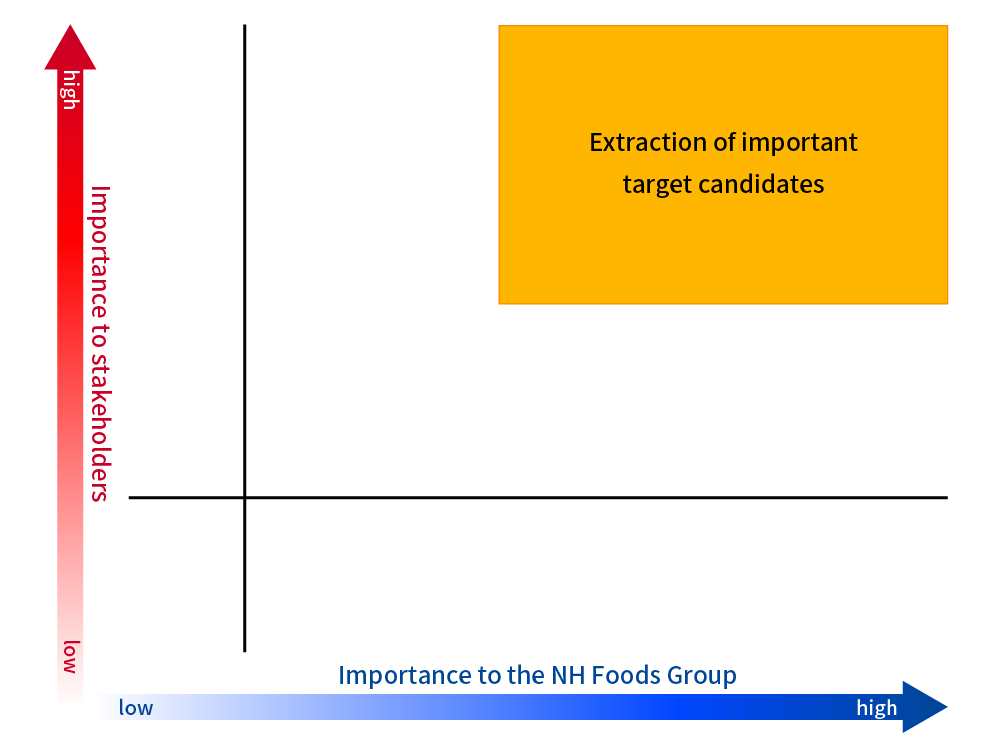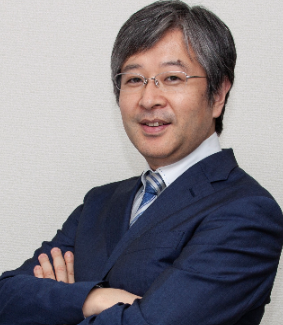History of Materiality Identification
- Conventional
- ■Managing the Five Key Issues
Identified challenges in the area of CSR as our five key issues, and promoted related initiatives. - FY 2021
- ■Identifying the five key issues (materiality)
During the formulation of NH Foods Group Vision 2030 and Medium-Term Management Plan 2023, we incorporated the perspective of solving social issues through our business, and reviewed and identified the five existing key issues as the five areas of materiality. - FY 2024
- ■In conjunction with the formulation of NH Foods Group Medium-Term Management Plan 2026, we reviewed and identified the five areas of materiality in consideration of changes in the business environment along with the social conditions encompassing the Company.
Review and identification process
In reviewing and re-identifying materiality, we evaluated and examined the issues from both our stakeholders' and our own perspectives. In addition, we took into account international trends, initiatives and other social demands, and the business environment and social conditions encompassing the NH Foods Group, as well as the challenges in Medium-Term Management Plan 2026.
- Step 1: Comprehensively identify ESG issues
- Comprehensively identify ESG issues based on GRI, ISO 26000, SDGs, industry-specific issues (SASB, SBT FLAG), domestic and international social issues, livestock industry-specific issues, and issues faced by the Company.
- Step 2: Classify issues by theme
- Classify and organize the issues identified in Step 1 by theme.
- Step 3: Conduct materiality assessments
- Conduct interviews with Sustainability Promotion Committee members regarding the ESG issues classified and organized in Step 2. The ES Subcommittee, a supporting organization under the Sustainability Committee, also conducts materiality assessments. The following perspectives are considered when assessing materiality.
- Our Company:
- Consistency with profits, costs, reputation, compliance, and business strategies
- Stakeholders:
- Consumers, customers, business partners, governments, shareholders/investors, global environment, employees, local communities, international society
Also extract operational and other issues related to the areas of materiality identified in 2021, and investigate points that need to be revised in conjunction with the results of the materiality assessments.

- Step 4: Validate
- Before ultimately receiving approval from the Board of Directors, the areas of materiality identified based on the materiality assessments are validated by the Sustainability Committee and by a council composed of executive officers.
Dialogue with External Experts
We sought opinions from experts in various fields regarding the "materiality" of the NH Foods Group. We received a wide range of perspectives, not only on the setting of materiality but also on expectations for the future.

Ichiro Asahina
CEO
Aoyama Shachu Corporation
- General The materialities are well-balanced and reflect an emphasis on compatibility with the Group's business activities. With more and more companies aiming to contribute to the creation of a sustainable society through the development of protein raw materials, I hope that the Group will continue to supply plant-derived protein products and other new types of protein, while pursuing further R&D in this area.
- Creating new values I have been very impressed by the way that the Group has used its strengths to pursue the entertainment value of food and create a new food culture, such as through the development of the F Village community. The Group should be able to work with communities around Japan to develop food supply strategies based on upstream, midstream, and downstream concepts, such as food entertainment parks.
- Fostering an organizational culture focused on new challenges Most people interpret leadership as the ability to lead other people. In fact, it really means the ability to lead oneself and start up new initiatives. If every individual is aware of this concept, the Group's focus on fostering an organizational culture focused on new challenges will enable diverse people to achieve career development. Other ways to accelerate the development of an organizational culture focused on new challenges include collaboration and co-creation activities with venture companies.

Mari Yoshitaka
Fellow (Sustainability),
Mitsubishi UFJ Research and
Consulting Co., Ltd.
- General I hope that NH Foods will identify both risks and opportunities and use its strengths to create a narrative.
- Stable procurement and supply of proteins The Group's recognition of farmer support and co-creation as key priorities is an extremely positive step at a time when the livestock industry is facing a variety of issues, including a shrinking and aging workforce. Even greater benefits could be achieved by disclosing information about initiatives relating to specific issues affecting overseas and domestic procurement, such as priority policies and reports.
- Creating new values I feel that the development of the F Village community would be more convincing as a priority goal with the addition of other dimensions, such as the use of the Group's strengths in the area of food to contribute to community development as well as providing entertainment.
- Fostering an organizational culture focused on new challenges The Group should pursue initiatives that identify its visions and goals as outcomes of challenges by individuals and respect for diversity.

Kenichi Takeda
Professor Institute of Agriculture,
Academic Assembly Shinshu University
- Stable procurement and supply of proteins The Group should be able to enhance the value that it provides by taking a new look at the value of protein from meat. For example, it could highlight the unique nutritional benefits that can only be provided with meat protein. I also hope that NH Foods will provide food education as part of its role as a food manufacturer.
- Contributing to a sustainable environment The Group has shown a strong commitment to research targeting the reduction of livestock-derived GHG emissions. I hope that they will also pursue initiatives based on a recycling-based approach to livestock farming, such as increased utilization of livestock waste.
- Creating new values Stakeholder understanding could be enhanced by providing a little more detail about the Group's strategic direction in relation to new value creation. I hope that the Group will go beyond the development of the F Village community by expanding its circle of co-creation to encompass various regional locations.
